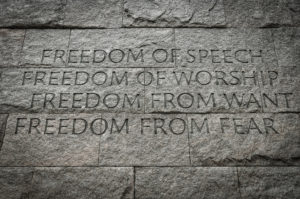Choosing When to Pray
November 1, 2016Prayer is an important part of the spiritual lives of many UUs—but we also are clear that people need to choose for themselves how and when they will pray. It isn’t the government’s place to decide that for people.
In the early 1960s the UU Schempp family helped to make that clear in American law. Sixteen-year-old Ellery Schempp wasn’t comfortable with having to say the Lord’s Prayer and listen to Bible readings at his public school. His parents, Ed and Sidney Schempp, talked about the issue with Ellery and his siblings Roger and Donna. Together they decided that not only was it not right for Ellery to have to say a prayer he didn’t believe in, no kid should be required to say a prayer that didn’t match their beliefs or faith tradition.
So the Schempps challenged the school in court, and their case went to the Supreme Court. In 1963 the court ruled in Abington Township School District v. Schempp that it was unconstitutional for a public school to expect students to participate in school-sponsored religious activity. The 1st Amendment of the US Constitution guarantees freedom of religion, and a UU family stood up to make sure that children were included in that guarantee.
Renew Your Membership
We invite you to join your fellow CLFers to renew your CLF membership and stewardship of the CLF for another year.
Support the CLF
Can you give $5 or more to sustain the ministries of the Church of the Larger Fellowship?
If preferred, you can text amount to give to 84-321
Newsletter Signup
About
Quest for Meaning is a program of the Church of the Larger Fellowship (CLF).
As a Unitarian Universalist congregation with no geographical boundary, the CLF creates global spiritual community, rooted in profound love, which cultivates wonder, imagination, and the courage to act.
Contact
Church of the Larger Fellowship Unitarian Universalist (CLFUU)
24 Farnsworth Street
Boston MA 02210



